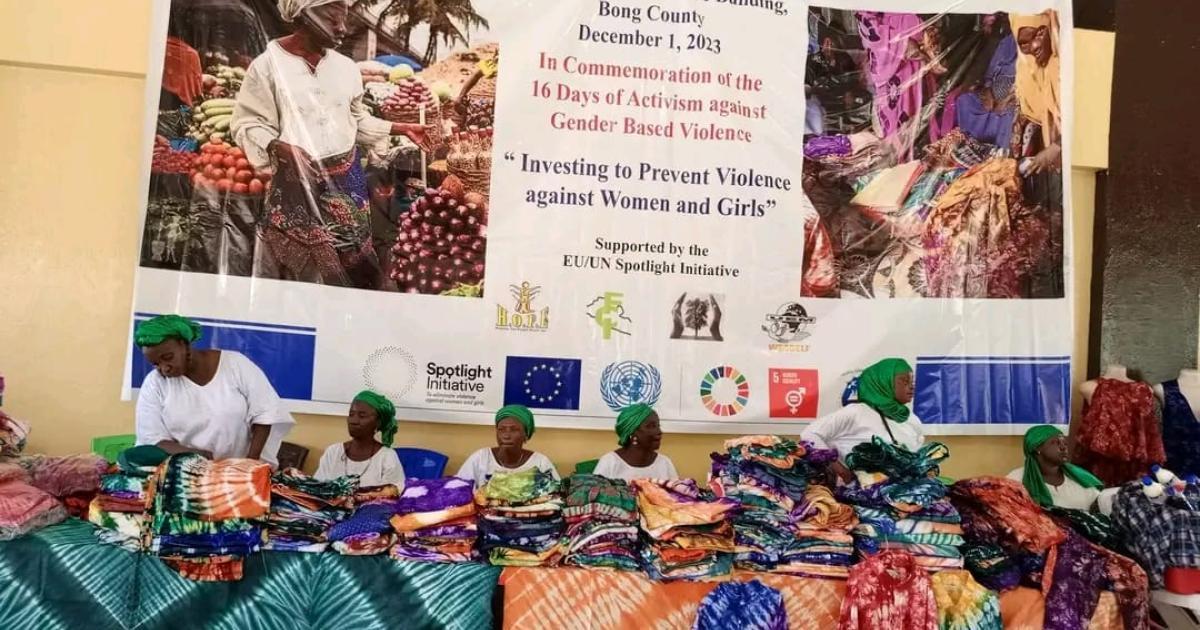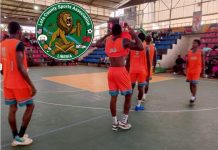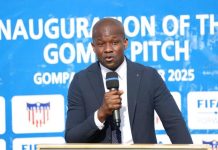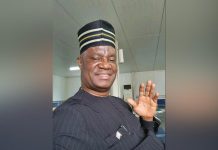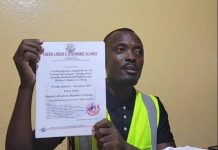Africa-Press – Liberia. A day long Traditional Women’s Farmer/Trade Fair organized by HOPE-Liberia and its partners has successfully concluded in Gbarnga, Bong County.
The event, held Friday, December 1, was in commemoration of the 16 days of activism against gender-based violence, under the theme “Investing to prevent violence against women and girls.” The project received support from the European Union/United Nations through its Spotlight Initiative.
According to the organizer, HOPE, the fair was held as part of a promise made to traditional zoes during the ceremony of the banning of Female Genital Mutilation (FGM) in Liberia’s practicing counties. UN Women Liberia and EU Country Representatives had assured the traditional leaders that alternative economic livelihood programs would be provided to traditional practitioners as part of efforts to eliminate FGM in Liberia.
“This Fair is a fulfillment of a promise made to the traditional zoes during the banding ceremony of FGM in the 11 practicing counties in Liberia,” Alfreda Nmah, Hope Liberia Acting Executive Director, said at the opening of the event. “UN Women and the EU assured the traditional leaders that alternative economic livelihood programs were going to be provided for the traditional practitioners as part of interventions to eliminate FGM in Liberia.”
In line with this commitment, the UN, EU, and partners have established four vocational and heritage centers in Montserrado, Grand Cape Mount, Lofa, and Nimba counties. These centers provide traditional practitioners and young women and girls with opportunities to learn new livelihood skills.
The Traditional Women Farmer/Trade Fair served as a platform for traditional women to showcase their locally made products, including tie-dyed clothes, soap, bleach, handbags, and more.
“The UN, EU, and other partners have established four vocational and heritage centers in four Counties, which are providing alternative economic livelihoods for the traditional people,” she disclosed. “Those centers are serving as dedicated learning centers for traditional practitioners and young women and girls to acquire new livelihood skills.”
She further said the one-day Traditional Women Farmer/Trade Fair is intended for the traditional women to showcase their locally made products in the Country.
HOPE-Liberia, a national Civil Society Organization that aims to promote the social, economic, and educational empowerment of women and children through personal development opportunities, community partnerships, policy review, and advocacy, described the Fair as a platform to empower traditional women, especially at a time when they are being constrained to put an end to some sources of livelihood.
The group emphasizes ownership and empowerment by bringing the people we serve and key institutions together to find sustainable solutions to social issues.
Majula B. Daramy, the head of Muslim zoes in Montserrado County, expressed gratitude to UN Women Liberia and the EU for the knowledge provided, as it has empowered them to improve their livelihoods.
J. Mark Brown, the desk writer or SG for Chief Affairs at the National Council of Chiefs and Elders of Liberia (NACCEL) described the skills training programs for traditional women as a positive venture, emphasizing that the alternative livelihood options offered would prevent them from returning to the practice of FGM.
Brown, on behalf of the NCCEL, pledged ongoing advocacy for the betterment of traditional practices in Liberia. He also encouraged the traditional women to take the alternative livelihood knowledge offered by the UN and EU through HOPE Liberia and its partners seriously.
Moses R. Gbanyah, the Regional Agriculture Coordinator of Liberia, commended HOPE Liberia and its partners for their work in supporting traditional women, emphasizing the importance of their contribution to Liberia’s development.
He also pledged the Ministry of Agriculture’s commitment to collaborating with traditional women to enhance their production.
For More News And Analysis About Liberia Follow Africa-Press

